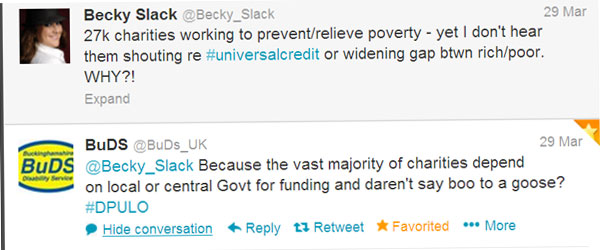With the Welfare Reform Act 2012 coming into force, charities face increased pressure on their services from the most vulnerable in society, but do they have a co-ordinated voice to speak up for them, asks Vibeka Mair.
As 1 April heralded some of the biggest changes to welfare and the NHS in years, charities voiced their concerns.
Richard Hawkes, chief executive of Scope, delivered a stark warning in the New Statesman on the effect of six different cuts to support for disabled people, while the Teenage Cancer Trust warned that thousands of youngsters could face life-threatening delays in being diagnosed with cancer because of the government’s shake-up of the NHS. Gerri McAndrew, chief executive of Buttle UK, a grantmaker to families in poverty, highlighted one of the less remarked-upon aspects of the welfare reforms – the ending of the discretionary social fund that provides for some of the most vulnerable members of the community at times of distress.
And homelessness charity Crisis said at the weekend that government changes to benefits would heap misery on the UK’s poorest families, predicting long queues at food banks and increases in homelessness. Fellow homelessness charity Shelter has reacted to the welfare reforms by offering advice on the controversial ‘bedroom tax’ with telephone helplines and online guides.
Shelter often comes under attack from certain Tory MPs for its focus on campaigning. For example, Charlie Elphicke MP for Dover & Deal has argued on a number of occasions that it should not have charitable status: “Why should a charity that spends most of its income on campaigning get charitable status when a political think tank could not?” he has asked.
And Lord Hodgson, who led the Charities Act Review, has suggested that MPs think campaigning charitable organisations are starting to go too far: “They [charities] are starting to push the envelope substantially,” he said. “Members of Parliament come to me and complain that charities are getting involved in areas which are the work of MPs.”
The sector has recognised the growing attacks on its right to campaign - most recently Save the Children came under fire for its first appeal to help the UK's poorest children. Umbrella body NCVO has said it is ready to fight against any attack on charity campaigns. Its chief executive Sir Stuart Etherington has highlighted three areas of difficulty as a result of welfare reforms:
- The logistical challenge of meeting the growing need for advice and support from people struggling to get to grips with the new system
- The challenge of speaking up on behalf of the most vulnerable in a hostile public opinion environment
- The challenge of maintaining a constructive working relationship with government while fighting for the best deal for vulnerable people
His last point is very important. For many years the sector has enjoyed rises in the level of public funding it receives. But has this clipped its tongue? Freelance PR and journalist Becky Slack highlighted this over the weekend –

Charity Commission chair William Shawcross has also raised the issue. While defending campaigning, he has said charities are at risk of becoming too dependent on the state. Even NCVO has admitted that taking money from the state has made it harder for charities to speak out.
It’s an issue that the charitable sector will need to address. While many individual charities have voiced strong opposition to some aspects of welfare reform, I was surprised there was no real concerted effort - such as with the successful charity tax cap campaign last year - to analyse and challenge the changes to welfare and the NHS on the most vulnerable in the society. Let's hope that as the real impact of the changes are realised over the coming months, charities start to come together.










